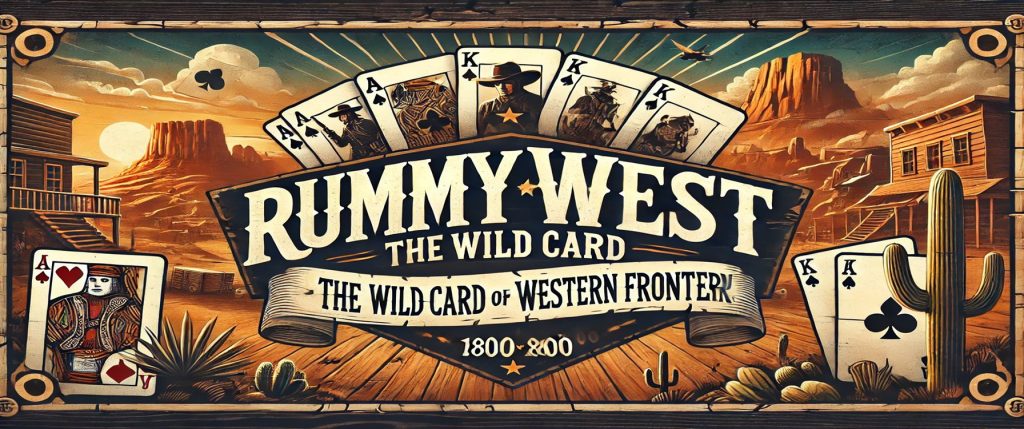Description

The Legend of Rummy West: Often portrayed as a stereotypical outlaw of the Wild West, Rummy West is a name that endures in American folklore. His legend embodies the spirit of adventure and rebellion that defined the time period and is rich in mystery and intrigue. Rummy, who was born in the middle of the 19th century, was reportedly raised in a turbulent setting where grit and cunning were essential for survival and lawlessness was the norm. There are many fabricated stories about his early years, but some claim he was a talented card player who soon fell victim to the shady world of frontier gambling. His skills were sharpened by this early experience, which also prepared him for his future adventures as a well-known outlaw.
The stories of Rummy West’s exploits expanded along with his mythology. He became a fascinating figure who embodied the ideal of the tough individualist who lived by his own rules and disobeyed authority. His audacious thefts, narrow escapes, and enchanting personality captivated audiences hungry for adventure stories, spreading like wildfire throughout saloons and campfires. Rummy’s image was further enhanced by the Wild West’s romanticism, which portrayed outlaws as anti-heroes battling an unjust system. Rummy West’s reputation as a legendary figure whose life story would be recounted for generations to come was cemented by this duality, which was both feared and admired.
Rummy West: An Iconic Character in the American West. The adventurous adventures that Rummy West had, which had a profound effect on the American frontier, have become a part of Western folklore. In a dark saloon in Deadwood, South Dakota, he played a high-stakes game of poker, one of his most notorious acts. Rummy was said to have outwitted some of the most infamous gamblers of his era with his quick wit & keen intuition, leaving them with a fortune that would finance his next adventure.
A Master of High-Stakes Gaming and Social Dynamics. This specific incident demonstrated his skill at gambling as well as his ability to negotiate the perilous social dynamics of the frontier. The tension in the air and the excitement of the game combined to create an unforgettable evening that would be talked about in whispers for years to come. Rummy thrived in the high-stress setting of the Wild West because of his ability to read people and circumstances.
A Master Thief’s Development and a Courageous Train Robbery. A bold train robbery was another well-known incident that solidified Rummy’s standing as a master thief. A freight train carrying gold bullion was the target of a carefully planned heist that he masterminded with a small group of devoted accomplices.
The operation was carried out precisely; before law enforcement could react, Rummy and his group were able to overpower the guards and steal their prize by intercepting the train at a distant location. A History of Risk and Excitation. His rise to fame was aided by these adventures, which portrayed him as a man who lived for thrills & danger and personified the Wild West. Rummy West’s name became a byword for courage, slyness, and a willingness to take chances, & people who heard about his exploits were both awed and terrified.
As the head of a notorious gang that came to represent lawlessness in the Western territories, Rummy West was not an isolated individual. This diverse team was made up of people with a range of backgrounds, each contributing special talents. While some were proficient marksmen or adept at organizing complex heists, others were master horsemen.
Both settlers and law enforcement were terrified by the powerful force they created together. Rummy led the group through dangerous situations with charm and guile, and their friendship was based on respect for one another and shared experiences. The gang was well-known for its daring escapes from law enforcement in addition to their robbery exploits. In one especially terrifying instance, they were shot at by a posse that was out to get them.
The gang’s skill at outwitting their assailants became legendary, and they developed a folklore of narrow escapes through difficult terrain and cunning detours. Rummy was renowned for his ability to think quickly & maintain composure under pressure, and his leadership was crucial during these encounters. Among his peers, he was both feared & respected, which only strengthened his position as an outlaw leader. The Western frontier was significantly impacted by Rummy West, which shaped not only the criminal scene but also how society viewed outlaws in that time period. His adventures helped to fuel a growing interest in lawlessness and defiance of authority, which struck a deep chord with many settlers who felt excluded by governmental regulations and financial difficulties. Rummy came to represent resistance, capturing the essence of people who wanted to be free from social restraints.
His acts provoked discussions about justice and morality, upending accepted ideas of right and wrong in a world that is changing quickly. Also, Rummy’s influence on the frontier had observable consequences for communities & local economies. Law enforcement and outlaw tensions escalated as a result of his gang’s frequent targeting of banks and wealthy merchants in their robberies. The social dynamics of the towns that were subjected to Rummy’s exploits changed; residents’ increased vigilance was frequently caused by fear, which also fostered an underground culture that romanticized life as an outlaw.
The mythos surrounding outlaws in general grew as a result of the spread of stories about Rummy West, which shaped how future generations would view this turbulent chapter in American history. Over the course of his criminal career, Rummy West eluded capture despite multiple attempts by law enforcement. His ability to avoid capture became legendary, & stories abound about how he repeatedly eluded law enforcement. One noteworthy instance involved a large-scale manhunt following an especially heinous heist; law enforcement officers from several regions united to try & capture him. But because of his deep familiarity with the area, Rummy was able to find his way through obscure paths and isolated hiding places, leaving his pursuers disoriented and without anything. Residents & visitors alike were captivated by the game of cat & mouse that developed between Rummy West and law enforcement.
Newspapers detailed every unsuccessful effort to apprehend him, frequently exaggerating specifics to pique readers’ curiosity. Rummy’s status as an outlaw hero was only strengthened by this media craze; he captured people’s attention nationwide and became a symbol of defiance against authority. His legend was further enhanced by his elusive personality, which made every run-in with the law seem like a part of a continuous story that would ultimately determine his place in history. Rummy West’s legacy is intricately woven into American folklore, where he is frequently presented as both a hero and a villain. Generations have told his story, which has taken on different forms over time to reflect shifting social views and ideals regarding crime and justice.
He is hailed in some stories as a Robin Hood character who robbed the wealthy to help the poor, while in others he is portrayed as a vicious criminal whose deeds caused suffering to innocent people. This dichotomy illustrates the complexity of human nature and our propensity to romanticize people who defy social expectations. Rummy West folklore has also given rise to a number of myths and legends that still hold audiences’ attention today. His adventurous exploits have served as the basis for innumerable novels, movies, and songs that examine themes of moral ambiguity, rebellion, and adventure. These tales frequently conflate fact and fiction, giving Rummy’s persona a timeless aura of mystery.
Rummy West continues to be a significant figure in conversations about outlaws and their role in American history as newly discovered generations add their own interpretations to his legend. Rummy West has influenced Western pop culture in a variety of ways, and its impact goes well beyond historical narratives. Numerous literary, cinematic, and television depictions of his character have been made, frequently acting as a model for the ideal outlaw hero. Rummy’s essence is evident in a variety of characters who represent defiance against authority while battling their own moral codes, from vintage Western movies with tough cowboys to contemporary adaptations that examine difficult moral quandaries.
Also, Rummy’s tale has played a significant role in influencing how the general public views outlaws in popular culture. Outlaws’ lives and decisions have become fascinating due to their romanticized depiction as misunderstood anti-heroes. This cultural phenomenon has given rise to a whole genre of stories that examine the motivations, hardships, & eventual outcomes of outlaws like Rummy West.
As a result, stories about freedom, justice, and the human condition still touch on Rummy’s legacy today. Even though Rummy West’s legend is fascinating, it is crucial to discover the reality behind the myth. Over time, many parts of his life story have been fabricated or changed, creating a complicated web of truth and fiction. Only a small portion of his actual exploits are documented in historical records; most of what is known is based on sensationalized accounts and oral traditions that date back many years. This mixing of myth and reality begs the question of how we write stories about historical personalities and which facts we choose to highlight or minimize.
By critically analyzing Rummy West’s life, we can learn more about more general issues pertaining to morality, identity, and social values in the Wild West. By distinguishing reality from fiction, we can see how myths like Rummy West capture our shared consciousness, including our complex moral convictions, yearning for adventure, and freedom from oppression. Deciphering these myths ultimately enables us to examine how stories influence our understanding of history itself in addition to understanding Rummy West as a person. To sum up, Rummy West is a timeless representation of the Wild West whose life story inspires interest and discussion long after his time has passed.
We learn a lot about an individual outlaw as well as the larger cultural narratives that shape our perception of this significant era in American history through his exploits, gang affiliations, influence on society, elusive nature, folklore legacy, pop culture influence, & the continuous search for the truth behind his mythos.


